Best Password Manager for Business in 2025: Top 5 Paid & Free Software List
Finding the best password manager for business can be tricky with all the available options. We researched multiple services and settled on this list of the top five password managers for business, including 1Password, Dashlane and Keeper.
Businesses with multiple online accounts need to safely manage employee and client credentials. The best password managers for business offer encrypted digital vaults, secure password sharing, password generators, multi-factor authentication, advanced admin controls and autofill features to help keep business accounts safe.
We tested multiple password managers and narrowed it down to this list of the top five password managers for business. The best tool for your business will depend on the number of employees, the features you’re looking for, the tools you need to integrate it with and your budget. Check out our list of the best password managers for more tools to consider.
-
11/02/2022
Rewrote the article; overhauled list with new picks to reflect password managers.
-
07/03/2024 Facts checked
Rewritten to include current information about features, pricing and company news.
How to Choose the Best Business Password Manager for Your Large or Small Business
Businesses store troves of sensitive client data, so safeguarding employee and admin accounts from cybercriminals is essential. The features below will help you choose the best password manager for your business.
- Robust security: This includes encrypted vaults, frequent security audits, dark web monitoring, data breach notifications and biometric login options to protect business data.
- Friendly user interface: A user-friendly interface allows all employees to use the password management tool effectively, whether they’re beginners or pros.
- Cross-platform compatibility: The tool should be accessible on any platform or operating system, allowing employees to access their accounts from multiple devices.
- Multi-factor authentication: MFA options ensure anyone logging in to an account is authorized. It includes email and SMS codes, authenticator apps, security questions and biometrics.
- Advanced admin controls: Robust admin controls let admins control how much access is granted to each employee, ensuring hierarchical and secure access to password vaults.
- Customer support: The tool should have convenient and responsive customer support options to help manage password vault issues.
- Strong password generator: The tool should help users generate strong, unique passwords for new accounts and replace weak or reused passwords.
- Secure password sharing: The tool should allow secure sharing that lets employees transfer sensitive data and passwords to each other through encrypted channels.
- Emergency access: Users should have emergency access for quick account recovery and access in dire circumstances. This ensures no business accounts are permanently lost.
- Price: The tool should be affordable and within budget while providing value for your money. However, this depends on the scale, size and unique needs of each business.
The 5 Best Password Managers for Business Teams
The five best password managers are all superior tools that work great for business, but some outshine the rest in terms of features, functionalities, pricing and general ease of use. Let’s take a look at each tool and explore the features they offer.
1. 1Password — Best Password Manager for Business Overall
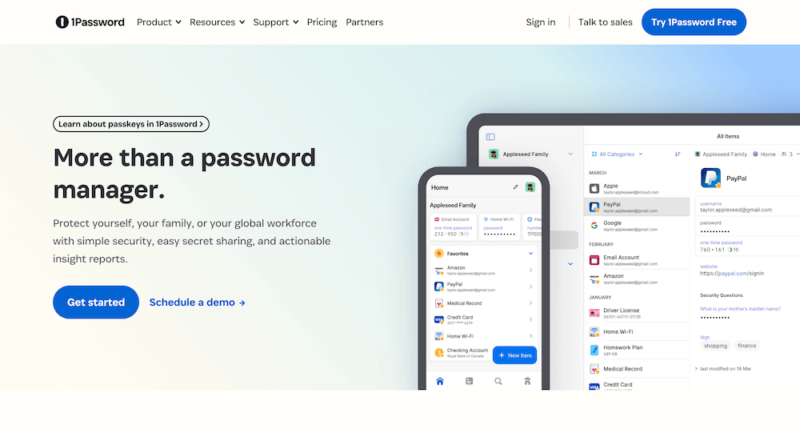
is affordable and offers robust security features.
| Starting Price | Cross-Platform | User Interface | Security | MFA | Admin Controls | Storage | Features |
|---|---|---|---|---|---|---|---|
| 4.5/5 | 4.9/5 | 5/5 | 4.9/5 | 5/5 | 4.9/5 | ||
| $3.99 | Android, iOS, macOS, Linux, Windows & command line Browser extensions for Chrome, Edge, Safari, Firefox & Brave | Light, airy & easy to navigate | Applies AES-256 encryption & zero-knowledge architecture | Dedicated app, TOTP, Authy & Duo | Create custom groups to manage teams | 5GB for Business & 1GB for all other plans | – Travel mode – Email masking – Temporary sharing |
1Password is an affordable tool that gives business users 5GB of encrypted storage, dedicated support, 20 guest accounts for vault sharing and a free Families plan for all members. You can generate custom reports, get priority access to new features and actionable insights on breaches, password health issues and team usage.
If you have 75 users or more, you also get customized onboarding and training, as well as a dedicated account manager. 1Password uses AES-256 and zero-knowledge architecture to encrypt your business data.
- Unlimited storage, 1GB document storage
- Up to five users, Up to 5 additional guests
- up to 10 users per month; Actionable security alerts; Domain Breach Report
- per user per month; Includes Teams Starter Pack, plus: Integrates with Okta, Entra ID, OneLogin, Duo, and more; Advanced reporting, granular admin controls, end-to-end encryption; Friendly, expert phone support
2. Dashlane — Best Password Manager for Business Enterprises
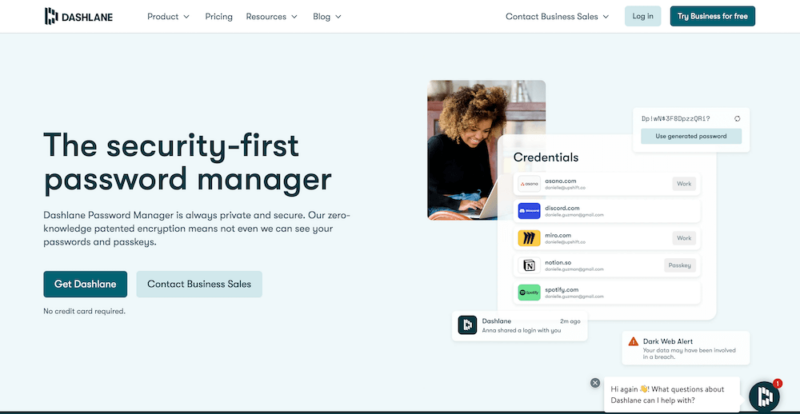
| Starting Price | Cross-Platform | User Interface | Security | MFA | Admin Controls | Storage | Features |
|---|---|---|---|---|---|---|---|
| 4/5 | 4/5 | 4.5/5 | 4.9/5 | 4.5/5 | 4.5/5 | ||
| Free | Android, iOS & macOS Browser extensions for Firefox, Chrome, Safari, Edge & Chromium | Airy interface that’s easy on the eyes | Applies AES-256 encryption & zero-knowledge architecture | Sends email codes, Google Authenticator & Microsoft Authenticator | Admin console available | 1GB for all plans | – VPN – Phishing alerts – Personalized security alerts |
Dashlane Business lets you add unlimited members and securely share unlimited passwords with colleagues. You get a password health score dashboard, SCIM provisioning, SIEM and SSO integrations. Users can create strong passwords for accounts using the password generator. Two-factor authentication and phishing alerts add layers of security to your accounts.
Business users get a Friends and Family dashboard and live chat, email and on-demand phone support. Companies with 50 users or more have a dedicated account manager. On the downside, passwordless login through biometric authentication is only available on mobile to Premium and Friends & Family plan users.
- One device at a time, 25 passwords and login details, Autofill fields, Password Generator, Set up account without a master password
- Billed annually, Unlimited devices, Unlimited passwords & passkeys , Secure sharing, Dark Web Monitoring, VPN for WiFi protection, Real-time phishing alerts, Passwordless login (currently new mobile users only)
- Billed annually, 10 accounts, 1 subscription, Everything in Premium
More plans
- Per month for 10 employees Billed annually Coverage for 10 employees Unlimited passwords, passkeys, & payments Unlimited Collection sharing Admin Console Password Health score Basic Activity Logs Admin-assisted account recovery Dark Web Monitoring
- Price is billed annually; Everything in Standard, plus: Unlimited employees Granular sharing controls Real-time phishing alerts Single sign-on (SSO) integration SCIM provisioning SIEM integration Advanced Activity Logs Security policies VPN for WiFi protection Free Friends & Family plan for each user
- Billed annually, starting at 100 employees
3. Keeper — Safest Cloud-Based Password Manager for Business
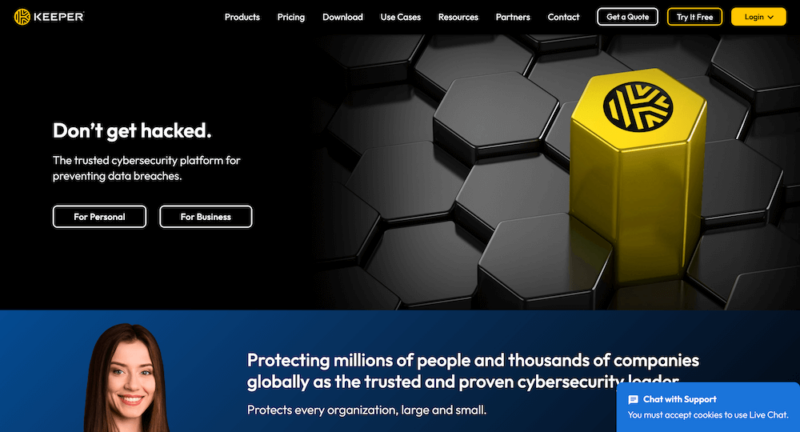
most password managers for business use.
| Starting Price | Cross-Platform | User Interface | Security | MFA | Admin Controls | Storage | Features |
|---|---|---|---|---|---|---|---|
| 4/5 | 4.5/5 | 4.9/5 | 5/5 | 4/5 | 4/5 | ||
| Free | Windows, macOS, Chrome OS & Linux Browser extensions for Firefox, Chrome, Safari, Edge, Opera & Brave | Intuitive interface that’s easy to use | Applies AES-256 encryption & zero-knowledge architecture, SSO & multi-factor authentication, including biometric options | SSO, Duo, RSA, PBKDF2, TOTP & Authy | Admin console available | Paid add-on | – Robust security – 14-day free trial for Business plan – Vault customization |
Keeper is a secure password manager that has attractive apps and browser extensions. Its business tiers offer basic 2FA, team management, shared team folders and activity reporting. Keeper lets you access your encrypted vaults from unlimited devices and manage team members with ease. Each user gets a free Family plan.
Delegated administration and advanced organizational structure are also available to Business plan users. However, features like advanced 2FA, single sign-on (SSO), automated team management, SCIM provisioning and command line provisioning are only available to Enterprise plan users.
- Price per month, billed annually Single user
- Price per month, billed annually Five private vaults
- Price per month, per user, billed annually Min 5 users Max 10 users
More plans
- Price per month, per user, billed annually Min 5 users
4. Zoho Vault — Best Password Manager for Business Teams
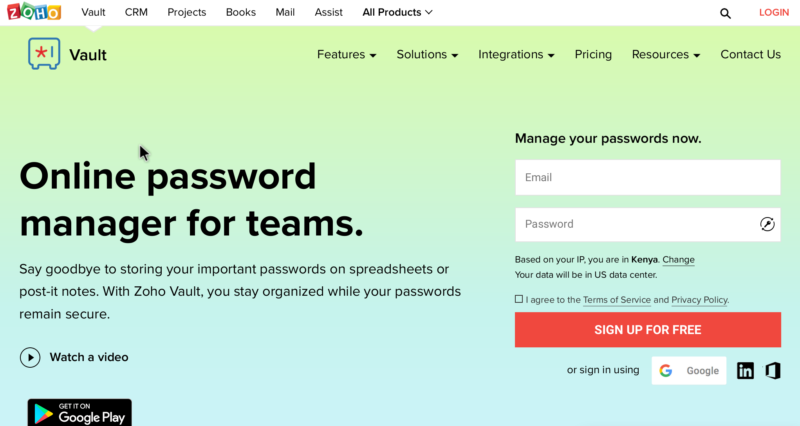
tools to help with team management.
| Starting Price | Cross-Platform | User Interface | Security | MFA | Admin Controls | Storage | Features |
|---|---|---|---|---|---|---|---|
| 4/5 | 4/5 | 4.9/5 | 5/5 | 4/5 | 4/5 | ||
| Free | iOS, Android. Windows, macOS, & Linux Browser extensions for Firefox, Chrome, Safari, Brave, Opera & Edge | Colorful, easy-to-use interface | Applies AES-256 encryption & zero-knowledge architecture | Zoho OneAuth, Google Authenticator, SMS OTP, YubiKey & voice call | Fine-grained, role-based permissions | Unlimited | -Integration with Zoho apps -Unlimited file storage -Emergency access for teams -Colorful interface |
Zoho Vault is one of the most affordable password managers on this list. It has a free plan that offers unlimited password storage, TOTP integration, passwordless login, a password generator and password assessment reports. You also get email support with the free plan. There’s no dedicated desktop app, but multiple browser extensions and mobile apps are available.
Zoho Vault’s paid tiers offer password sharing, role-based permissions and MFA via Google Authenticator and Microsoft Authenticator. Cloud backup and priority email, phone and remote assistant support are also available for paid users. It’s easy to integrate your password vault with other Zoho and third-party team management apps.
- Unlimited password storage
- User management, Vault backup, G Suite & Office 365 integration
- User groups, Password groups, Password changer
More plans
- SSO for cloud apps, Password event notifications, Integration with OKTA & OneLogin
- Contact sales for custom pricing; Customize your plan to fit your needs
5. Bitwarden — Best Open-Source Password Manager for Business
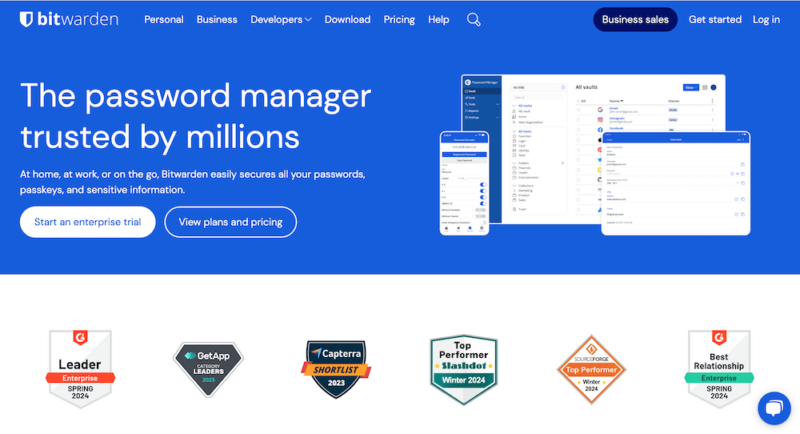
developers, making it secure for business.
| Starting Price | Cross-Platform | User Interface | Security | MFA | Admin Controls | Storage | Features |
|---|---|---|---|---|---|---|---|
| 4/5 | 4.9/5 | 4.9/5 | 5/5 | 4/5 | 4/5 | ||
| Free | iOS, Android. Windows, macOS, & Linux Browser extensions for Firefox, Chrome, Safari, DuckDuckGo for Mac, Brave, Vivaldi, Tor, Opera and Edge | Relatively complex interface | Applies AES-256 encryption & zero-knowledge architecture | YubiKey TOTP, Duo, FIDO2 WebAuthn, email & authentication app | System admin portal available | 1GB | -Open-source technology -Direct encrypted sharing -Vault health reports -Email aliases -Encrypted export |
Bitwarden has two business plans: Teams and Enterprise. You can add unlimited users, share unlimited files through collections, add TOTP integration, generate vault health reports and gain personal emergency access. In addition, you can employ 2FA via email codes or the dedicated Bitwarden Authenticator app, or use third-party apps like Duo, YubiKey OTP or FIDO2 for MFA.
Advanced features like passwordless single sign-on, free Families plans for users, account recovery, custom roles and SCIM support are only available to Enterprise users. Since Bitwarden is an open-source software, independent developers are continuously upgrading it. Though this makes it more secure, it also means its updates are few and far between.
- Unlimited storage, Multi-device sync, 2FA
- 1GB of encrypted file storage, Additional 2FA options, Password health reports, Priority customer service
- Billed annually, Six accounts
More plans
- Billed annually,Per user, includes all premium features
- Per user, includes all premium features and families plan for all users,
Honorable Mentions: The Best Password Managers for Business
We’ve listed a few additional tools that are great for password security and encrypted digital vault management. Though they didn’t make it to the top five, they’re safe options that are worth considering.
- LastPass: LastPass Business is an easy-to-use password security tool that’s affordable and available across multiple platforms. It didn’t make the top five for business because it has been breached before. Our LastPass review has more details.
- NordPass Business: NordPass Business accommodates five to 250 users and offers unlimited password storage, email masking, group management and secure item sharing. It lacks advanced password management features like intuitive form-filling capabilities, denying it a slot on our top-five list. Our NordPass review explains more.
- Norton: Norton is the best free password manager for business. It’s easy to navigate and provides all the basic features you need to effectively manage credentials. However, it lacks advanced features like form filling, emergency access, password sharing and administrative controls.
- KeePass: KeePass is a highly secure, open-source password manager that is constantly receiving new updates from independent developers. Even though it is completely free and packed with notable features, KeePass is complex to use and offers no live support options. Our KeePass review goes into more detail.
- Sticky Password: Sticky Password has a Premium for Teams plan that helps you with managing passwords for your business. However, Sticky Password has a clunky iOS app and form-filling system, and it lacks advanced business password analytics. Our Sticky Password review has more details.
- Password Boss: Password Boss offers secure cloud storage, role-based access, end-to-end encryption, two-factor authentication and device theft protection. On the downside, its dark web scanner is difficult to use and interpret, preventing it from earning a spot among the top five.
Our Methodology: How We Tested the Best Password Manager Software for Business
All good password managers perform similar functions: storing passwords and sensitive data while keeping security risks at bay. We researched multiple tools and tested our top picks to compile this list of the best business password managers.
We opened user accounts and tested each of our top five services’ setup process, security features, user interface, customer support options and general ease of use. Plus, we looked into other key features, including:
- Cross-platform availability: Does the tool have desktop apps, mobile apps and browser extensions for the major platforms?
- User experience: Is the tool easy to set up and navigate, or is it difficult to find what you need?
- Plan value: Are the features that each plan offers worth the money?
- Security: Which measures does the tool apply to keep user data safe? Has it ever been breached?
- Two-factor authentication (2FA): Which 2FA methods are offered, and are they convenient to use?
- Team management and admin controls: Does the tool offer admin controls, and can admins manage access to password vaults?
- Emergency access: Can team members access password vaults in case the admin is unable to?
- Customer support: Which customer support options are available, and how responsive are they?
How to Use a Password Manager for Business
Using a business password manager isn’t as complex as it may seem at first. We’ll take you through how to set up and use our top tool on this list, 1Password.
- Create an account: On 1Password’s website, choose the Business account and create an account using your email address.
- Verify your business email address: A verification code will be sent to your business email address. Enter it and click “next.”
- Create a password: Create a strong password that’s at least 10 characters long, re-enter it to confirm and click “next.”
- Generate and save your security keys: Once your password is set, prompt your device to automatically create the security key and save it.
- Input your payment details: Add your preferred payment method to make subscription payments after the trial period ends.
- Customize your account: You can now create a new vault to start securely saving your business passwords.
Why You Need a Password Manager for Business
You need a password manager for business to store all your passwords, autofill your details in online forms, share credentials, identify weak passwords, replace compromised passwords, monitor the dark web and generate strong passwords. It also helps you identify compromised accounts and generate a master password or secret key so only you can access your data.
Community Feedback: Best Business Password Manager Reviews on Reddit & Social Media
1Password and Bitwarden are the preferred tools for business on Reddit and social media. Several users also like to use 1Password for personal password management:
“Bitwarden is cheaper but lacks some of the features that 1Password provides. It depends on your budget and nice2have’s vs need2have’s.”
/u/DontPokeTheServer
Keeper also received some positive reviews:
“Keepers ability to be used as a shared MFA token for a team is a killer feature when you have to deal with MFA enabled systems that don’t otherwise support SSO or have master accounts etc.”
/u/ElectroSpore
Final Thoughts
Password managers help you securely store passwords and business credentials, create strong new passwords and share business passwords or account credentials through encrypted channels. You can also control access to password vaults among employees. We’ve identified the best password manager for business and highlighted the features to look for in a service.
1Password is the best business password manager based on our analysis. It is affordable, simple to use, secure and offers robust features for business. Though it doesn’t offer a free version, the 14-day free trial lets you take the Business plan for a spin.
Which password manager do you use for business? Have you used any of the tools listed here before? How was your experience? Let us know in the comments, and as always, thank you for reading.
FAQ: Business Password Manager Software
Yes, a small business should use a password manager to secure their business accounts and share their business credentials through encrypted channels.
The best password vault for business is 1Password. It’s easy to navigate, affordable and secure, and it offers a slew of features.
Use a password manager to manage passwords for a business. It will encrypt passwords, apply 2FA and help you create strong passwords.
Sources:
- The Cloud 100 2023 – Forbes
- Keeper Secures Repeat Win in CHIP Password Manager Test – Keeper Blog
- 2023-01-09 Norton LifeLock General Digital Data Breach Notice to Consumers – Norton (hosted by Vermont Attorney General’s Office)


